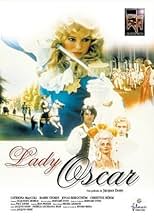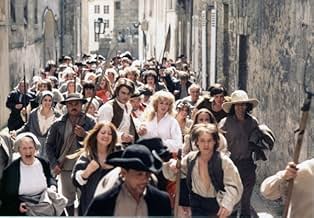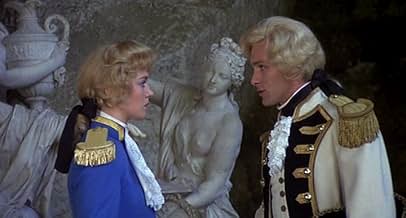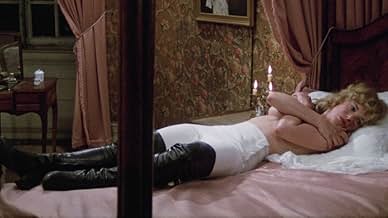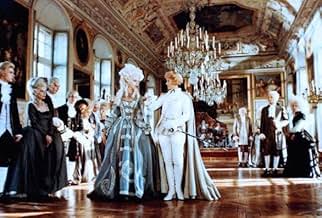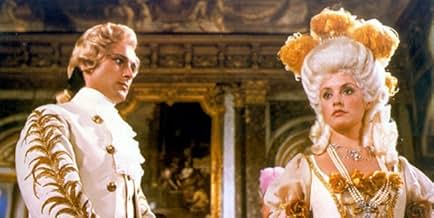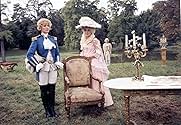Lady Oscar
- 1979
- Tous publics
- 2h 4min
NOTE IMDb
5,8/10
733
MA NOTE
Ajouter une intrigue dans votre langueThe story of Lady Oscar, a female military commander who served during the time of the French Revolution.The story of Lady Oscar, a female military commander who served during the time of the French Revolution.The story of Lady Oscar, a female military commander who served during the time of the French Revolution.
- Réalisation
- Scénario
- Casting principal
Avis à la une
To correct some inaccuracies in the above review, the anime "Rose of Versailles" came before "Lady Oscar," not afterward, and it was not targeted towards children. "Lady Oscar" is primarily based on the manga "Rose of Versailles" by Riyoko Ikeda, although it contains several plot differences from either anime or manga. The so-called "historical clichés" and the feminism the above reviewer cites are part of Ikeda's story and have nothing to do with the director of "Lady Oscar." I found the movie slightly disappointing in its variations from the anime and manga, but overall I liked it. It was nice to see the story of Lady Oscar presented in English, and I enjoyed seeing European actors filling the roles. Oscar's character differs greatly from her personality in the anime, but I found her much more personable in "Lady Oscar." I was disappointed, however, in the portrayal of Marie Antoinette as she was wholly flaky and unlikeable in "Lady Oscar" and lacked all the redeeming qualities she possessed in the anime. Also, the film overlooks the close nature of her relationship with Oscar as portrayed in Ikeda's manga.
This film is an absolute joke. The acting is so horrible that I got up during the film and went to check IMDb to have some entertainment from all of the scathing reviews I was sure I would find... Well, the critics didn't even bother to review it and the only published review was from a person who is probably related to the director or the producer. This film is so bad, I'm sure 40 years from now it will be a cult film simply for its downright awful acting!
As had been the case with Christian-Jaque's THE BLACK TULIP (1964), this is another French swashbuckler whom I first became aware of via the Japanese animated series I used to catch on Italian TV as a kid. Conversely, the film version of LADY Oscar proved to be more satisfying than that of THE BLACK TULIP, which is surprising given that the former is a maligned film within its distinguished director's canon. Having said that, along with his modernistic remake of Jean Cocteau's OPRHEE' (1950) entitled PARKING (1985), LADY Oscar had always been the one title I was most eager to catch from Demy's lean and near-invisible post-1973 period. It is ironic therefore that I have managed that feat before having acquainted myself with Demy's best-known and finest achievements of the early 1960s which is all the more remarkable when one considers that LADY Oscar was a bastard international production: a Franco-Japanese joint venture shot in English with a cast of equally mixed nationalities and whose tangled worldwide distribution rights have made it impossible for even the British Film Institute to secure a screening in their renowned National Film Theatre in London for a 'complete' Jacques Demy retrospective in November 2007! Therefore, all the more power to Yamato Video, the Italian DVD production company who specializes in releasing vintage Japanese anime series (that were all the rage on Italian TV as I was growing up in the 1980s and early 1990s) for succeeding where others have failed; a gallery of trailers from their catalogue is available as a supplement on the LADY Oscar disc and watching it was "a blast from the past" for me as the saying goes!
Anyhow, back to the film at hand: the fairy-tale qualities of the historical narrative are ideal hunting grounds for Demy, who had already brought DONKEY SKIN (1970) and THE PIED PIPER (1972) to the screen although, in this case, he drew inspiration from a Japanese comic strip rather than a local legend (albeit set in his native land). Needless to say, the film is a feast for the eyes when it comes to sets (some of the exteriors were actually shot on the Versailles Palace grounds) and costumes but, even if the work of Demy here seems not be counted among his finest achievements, a couple of elegantly sweeping camera movements (the clandestine meeting in the abandoned château between Queen Marie Antoinette and her Swedish lover) and well-mounted sequences (the vigorous fist-fight in the tavern) are certainly noteworthy; the same applies to the musical contribution of Demy's regular composer Michel Legrand. If there are distinct flaws, it's that the film moves at rather too deliberate a pace (with a running time of just over two hours) and has a needlessly unhappy ending.
In spite of the title, the narrative incorporates three parallel story lines that give a more sweeping picture of the tumultuous times it depicts (starting out in 1755 with the birth of Oscar and culminating in the storming of the Bastille that led directly to the French Revolution of 1789): Oscar's father had long wanted a male heir to follow him into his military career and when his wife dies in giving birth to yet another female, he determines to make a man of his newborn child regardless; while Oscar is eventually recruited as personal guard to Marie Antoinette, we follow the amorous exploits of the latter as well as the rise of one female peasant into aristocracy through devious schemes and callous behavior to her true peers (perhaps in emulation of the notorious Madame Dubarry whose name is mentioned at one point). In view of its origins as light-hearted kiddie fare, there is a surprisingly subversive undercurrent of sexual ambiguity in Oscar's imposed masculinity (and the fact that this starts a cross-dressing fad among the upper classes), the repressed feelings for her shown by the stable boy she grew up with, the full-blown kiss on the lips Oscar gives during her own supposed engagement party to a giggling young lady she's dancing with, etc.
Catriona MacColl looks just ravishing in the title role, both when dressed in her military outfit and also when she occasionally gives in to her womanhood (including a brief topless bit); this was her first film and arguably her best role since only another appearance for Demy and three in Lucio Fulci horror films including CITY OF THE LIVING DEAD (1980) for which she even recorded an exclusive audio commentary for its R2 DVD! really stick out from the rest of her filmography. Another beguiling presence in the film is undoubtedly that of Christine Bohm who plays Marie Antoinette; unlike MacColl (despite their being the same age), LADY Oscar proved to be her last film as she tragically died at 25 in an accident that same year. As for the male cast, the most prominent are Barry Stokes (as Oscar's stable boy companion and true love) and Martin Potter (as her jaded, titled but short-lived fiancé); incidentally, while they both had their artistic triumphs for major directors in Juan Antonio Bardem's THE CORRUPTION OF CHRIS MILLER (1973) and Federico Fellini's FELLINI - SATYRICON (1969) they each also worked for cultish British exploitation film-maker Norman J. Warren in, respectively, PREY (1978) and SATAN'S SLAVE (1976)!!
P.S. My amiably lazy feline pet goes by the name of "Lady Oscar": I had originally dubbed it Oskar in tribute to one of my favorite foreign films THE TIN DRUM (1979) because, like its protagonist, my cat seems to have stopped growing of its own accord (while that of my aunt, which is of a similar breed and only a year or so older, has become quite huge!); my mother, unaware of this connection, insists on calling her "Lady" because, first of all, it's a female and, frankly, really does act royally and has the genuine impression that we're there to wait on it!!
Anyhow, back to the film at hand: the fairy-tale qualities of the historical narrative are ideal hunting grounds for Demy, who had already brought DONKEY SKIN (1970) and THE PIED PIPER (1972) to the screen although, in this case, he drew inspiration from a Japanese comic strip rather than a local legend (albeit set in his native land). Needless to say, the film is a feast for the eyes when it comes to sets (some of the exteriors were actually shot on the Versailles Palace grounds) and costumes but, even if the work of Demy here seems not be counted among his finest achievements, a couple of elegantly sweeping camera movements (the clandestine meeting in the abandoned château between Queen Marie Antoinette and her Swedish lover) and well-mounted sequences (the vigorous fist-fight in the tavern) are certainly noteworthy; the same applies to the musical contribution of Demy's regular composer Michel Legrand. If there are distinct flaws, it's that the film moves at rather too deliberate a pace (with a running time of just over two hours) and has a needlessly unhappy ending.
In spite of the title, the narrative incorporates three parallel story lines that give a more sweeping picture of the tumultuous times it depicts (starting out in 1755 with the birth of Oscar and culminating in the storming of the Bastille that led directly to the French Revolution of 1789): Oscar's father had long wanted a male heir to follow him into his military career and when his wife dies in giving birth to yet another female, he determines to make a man of his newborn child regardless; while Oscar is eventually recruited as personal guard to Marie Antoinette, we follow the amorous exploits of the latter as well as the rise of one female peasant into aristocracy through devious schemes and callous behavior to her true peers (perhaps in emulation of the notorious Madame Dubarry whose name is mentioned at one point). In view of its origins as light-hearted kiddie fare, there is a surprisingly subversive undercurrent of sexual ambiguity in Oscar's imposed masculinity (and the fact that this starts a cross-dressing fad among the upper classes), the repressed feelings for her shown by the stable boy she grew up with, the full-blown kiss on the lips Oscar gives during her own supposed engagement party to a giggling young lady she's dancing with, etc.
Catriona MacColl looks just ravishing in the title role, both when dressed in her military outfit and also when she occasionally gives in to her womanhood (including a brief topless bit); this was her first film and arguably her best role since only another appearance for Demy and three in Lucio Fulci horror films including CITY OF THE LIVING DEAD (1980) for which she even recorded an exclusive audio commentary for its R2 DVD! really stick out from the rest of her filmography. Another beguiling presence in the film is undoubtedly that of Christine Bohm who plays Marie Antoinette; unlike MacColl (despite their being the same age), LADY Oscar proved to be her last film as she tragically died at 25 in an accident that same year. As for the male cast, the most prominent are Barry Stokes (as Oscar's stable boy companion and true love) and Martin Potter (as her jaded, titled but short-lived fiancé); incidentally, while they both had their artistic triumphs for major directors in Juan Antonio Bardem's THE CORRUPTION OF CHRIS MILLER (1973) and Federico Fellini's FELLINI - SATYRICON (1969) they each also worked for cultish British exploitation film-maker Norman J. Warren in, respectively, PREY (1978) and SATAN'S SLAVE (1976)!!
P.S. My amiably lazy feline pet goes by the name of "Lady Oscar": I had originally dubbed it Oskar in tribute to one of my favorite foreign films THE TIN DRUM (1979) because, like its protagonist, my cat seems to have stopped growing of its own accord (while that of my aunt, which is of a similar breed and only a year or so older, has become quite huge!); my mother, unaware of this connection, insists on calling her "Lady" because, first of all, it's a female and, frankly, really does act royally and has the genuine impression that we're there to wait on it!!
I've finally had the chance to watch Jaques Demy's movie - Lady Oscar. I waited so long to see it and i put so much enthusiasm on it that i almost can't bear the disappointment. As a big fan of Ryoko Ikeda, of "Berusaiyu no bara" and of the Japanese musical version of it, i have to confess: the movie HURT! The acting is so bad, the story is so cut, no fluidity between scenes ... and the end ... oh, that is really painful!!! Oscar is too cute ... no! better said: "sweet"... but OK. Marie Antoinette too stupid! Fersen .. where is Fersen??? So little appearance that i forgot he existed. Girodelle .. oh! ... disgusting! And was that brown haired girl really Rosalie? I think it was the opposite of her. The only character i can't comment on it, is Andre. He was (especially on the first part of the movie) ... he was Andree. He was human, real and acted well .. Pity he ended so stupid ... Everything in this movie have no meaning ... and some scenes are just ridiculous.
Jacques Demy's movie of Lady Oscar frequently moved me. It is not a "swashbuckler" in spirit, it does not glamourise violence; it is not a movie about "girl power". It is a tragedy that raises important questions about freedom and gender. After becoming father to a series of daughters whose mother dies in childbirth, Général de Jarjayes decides that his latest daughter will in fact be a son, Oscar, and brings her up to be an heir and defender of the de Jarjayes name. He is delighted to find her a position as bodyguard to Marie Antoinette. Oscar is unquestioning of the system into which she is inducted, a bubble of privilege, acid wit, and decadence. She is dutiful and she "knows her place". At the same time the young boy and later groom who was her companion when Oscar grew up seems to have much more class consciousness.
What her gender transformation helps to do is to de-romanticise the material, when Oscar accepts a duel, the result, devoid of machismo, comes off as a banal murder, which is precisely what it is. It is difficult to wholeheartedly see Oscar as an éoniste or transgender hero as her identity as Oscar is created for her by her father. Indeed her self-actualisation is intertwined with her accepting a more female identity. On the other hand she does use her identity as Oscar to react against male society, and becomes a role model for some of the Versailles women.
Oscar, despite adopting a male role, is not free. This is potentially quite an important point of the movie, equality and freedom are not the same thing. Her role is to hang around the wilful and indolent Antoinette, and she develops a strong sense that her life has become meaningless. To become a man is not to have meaning, it's an escape from a trap within a trap, the outer trap being the Ancien Régime in the case of this movie. When Oscar attempts to enter a regiment, her male soldiers refuse to obey her, and her superior officer gives her no support whatever. In any case the regiment only exists to suppress the people.
At a very late stage Oscar finds freedom in an act of defiance. You can feel the weight lift off her shoulders as she spends her first day as a truly free adult, despite residing in a prison cell. This feels very contemporary, freedom is something very few of us are born with, it's something we have to seize, it's profoundly personal and cathartic.
Another reviewer on this site refers to Barry Lyndon as inspiration, "Now the magic of that was its carefully spaced vacuums. It had engineered emptiness, something that only a master could do." That is definitely something Lady Oscar is attempting, in my belief it worked better than my fellow reviewer felt.
A note on historical accuracy. Thomas Jefferson described Marie Antoinette as, "...proud, disdainful of restraint, indignant at all obstacles to her will, eager in the pursuit of pleasure, and firm enough to hold to her desires, or perish in their wreck." That is exactly how she is portrayed in Lady Oscar by Christine Böhm. Jefferson also describes the relationship between the King and the Queen thus, "he had a Queen of absolute sway over his weak mind and timid virtue..." Again this seems to have been very well captured in the movie.
Lady Oscar is a politically complex movie which seems often to have been misjudged by relying on a fruitless comparative analysis with the animé and manga sources of the story. Whilst actually quite serious it does however have its gorgeous moments.
What her gender transformation helps to do is to de-romanticise the material, when Oscar accepts a duel, the result, devoid of machismo, comes off as a banal murder, which is precisely what it is. It is difficult to wholeheartedly see Oscar as an éoniste or transgender hero as her identity as Oscar is created for her by her father. Indeed her self-actualisation is intertwined with her accepting a more female identity. On the other hand she does use her identity as Oscar to react against male society, and becomes a role model for some of the Versailles women.
Oscar, despite adopting a male role, is not free. This is potentially quite an important point of the movie, equality and freedom are not the same thing. Her role is to hang around the wilful and indolent Antoinette, and she develops a strong sense that her life has become meaningless. To become a man is not to have meaning, it's an escape from a trap within a trap, the outer trap being the Ancien Régime in the case of this movie. When Oscar attempts to enter a regiment, her male soldiers refuse to obey her, and her superior officer gives her no support whatever. In any case the regiment only exists to suppress the people.
At a very late stage Oscar finds freedom in an act of defiance. You can feel the weight lift off her shoulders as she spends her first day as a truly free adult, despite residing in a prison cell. This feels very contemporary, freedom is something very few of us are born with, it's something we have to seize, it's profoundly personal and cathartic.
Another reviewer on this site refers to Barry Lyndon as inspiration, "Now the magic of that was its carefully spaced vacuums. It had engineered emptiness, something that only a master could do." That is definitely something Lady Oscar is attempting, in my belief it worked better than my fellow reviewer felt.
A note on historical accuracy. Thomas Jefferson described Marie Antoinette as, "...proud, disdainful of restraint, indignant at all obstacles to her will, eager in the pursuit of pleasure, and firm enough to hold to her desires, or perish in their wreck." That is exactly how she is portrayed in Lady Oscar by Christine Böhm. Jefferson also describes the relationship between the King and the Queen thus, "he had a Queen of absolute sway over his weak mind and timid virtue..." Again this seems to have been very well captured in the movie.
Lady Oscar is a politically complex movie which seems often to have been misjudged by relying on a fruitless comparative analysis with the animé and manga sources of the story. Whilst actually quite serious it does however have its gorgeous moments.
Le saviez-vous
- AnecdotesThe major sponsor of the film was the Japanese cosmetics company Shiseido. Catriona MacColl (Oscar) promoted a red lipstick for the spring cosmetic line that year.
- GaffesIn the ballroom scene we see a string quartet and a harpsichordist. However, we hear the soundtrack of a string orchestra.
- ConnexionsFeatured in L'univers de Jacques Demy (1995)
Meilleurs choix
Connectez-vous pour évaluer et suivre la liste de favoris afin de recevoir des recommandations personnalisées
- How long is Lady Oscar?Alimenté par Alexa
Détails
- Date de sortie
- Pays d’origine
- Langues
- Aussi connu sous le nom de
- Lady Óscar
- Lieux de tournage
- Jossigny, Seine-et-Marne, France(castle scenes)
- Sociétés de production
- Voir plus de crédits d'entreprise sur IMDbPro
- Durée
- 2h 4min(124 min)
- Mixage
- Rapport de forme
- 2.35 : 1
Contribuer à cette page
Suggérer une modification ou ajouter du contenu manquant


